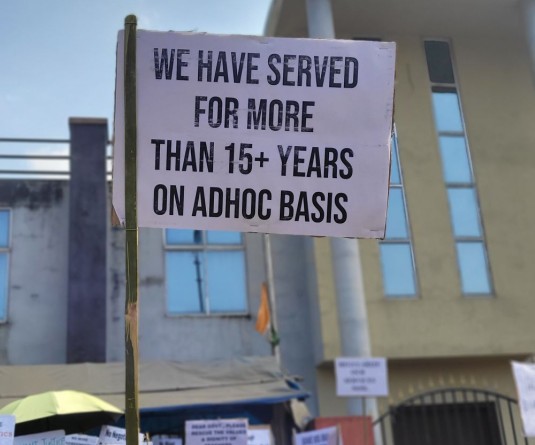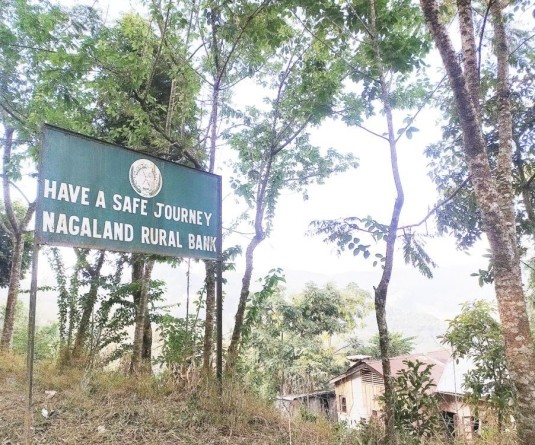Zunheboto, February 25 (MExN): A one-day seminar on National Education Policy (NEP) 2020 was organised at Nagaland University, Lumami on February 25.
The resource person, Prof MK Sinha, Director, IQAC shared that as per NEP 2020, the assessments of educational approaches in undergraduate education that integrate the humanities and arts with STEM (Science, Technology, Engineering and Mathematics) have consistently showed positive learning outcomes, including increased creativity and innovation, critical thinking and higher-order thinking capacities, problem-solving abilities, teamwork, communication skills, more in-depth learning and mastery of curricula across fields, increases in social and moral awareness, etc, besides general engagement and enjoyment of learning.
According to the Policy, a holistic education shall be, in the long term, the approach of all undergraduate programmes, including those in professional, technical, and vocational disciplines. The undergraduate degree will be of either 3-or 4-year duration, with multiple exit options within this period, with appropriate certifications. The 4-year programme will lead to a degree ‘with research’. A student can obtain a diploma after completing 1 year, or an advanced diploma in a discipline or field (including vocational and professional areas) after completing 2 years of study or obtain a bachelor’s degree after a 3-year programme.
HEIs will have the flexibility to offer different designs of Masters programmes, whereby there may be a two-year programme with the second year devoted entirely to research for those who have completed the three-year Bachelors programme; for students completing a four-year bachelor’s programme, there could be a one-year Masters programme; and, there may be an integrated five-year Bachelor’s/Masters programme.
Model public universities for holistic education, at par with IITs, IIMs, etc., called MERUs (Multidisciplinary Education and Research Universities) will be set up with the aim to reach the global status of, for example, the Ivy League Universities in the US.
States will have the flexibility to decide on the medium of instruction and would be encouraged to conduct more academic programmes in Indian languages or mother-tongue.
The HEIs as part of multidisciplinary education will focus on research & innovation by setting up start-up incubation centre, technology development centre, centre in frontier areas of research, greater industry-academic linkages, and inter-disciplinary research including humanities/social science research. Over a period of time, the HEIs will evolve into research-intensive universities (RUs), teaching universities (TUs), and autonomous degree-granting colleges (ACs).
By 2040, all higher education institutions (HEIs) shall become multidisciplinary institutions and shall have student enrolments in the thousands, for optimal use of infrastructure and resources.
As per the NEP 2020, a single regulatory body will guide higher education in India. The regulatory body called Higher Education Commission of India (HECI) will have 4 verticals dealing with different functions of higher education: National Higher Education Regulatory Council (NHERC); General Education Council (GEC) Higher Education Grants Council (HEGC); and, National Accreditation Council (NAC).
A central body called National Research Foundation will be created to build a strong research culture and research capacity across different domains in higher education. Among others, the NEP 2020 aims to increase the Gross Enrolment Ratio from 26.8 per cent to a stage that is close to universalisation (50 per cent) by 2035.
Prof MK Sinha also dwelt on the implementation aspects of NEP 2020.
In his observation, Dr Maongsangba, Controller of Examination, dwelt at length on the NEP 2020, with special focus on the implementation issues. Among others, he said implementation must necessarily be done in a phased manner. He concluded by asserting that, as far as implementation is concerned, there is a need for proper planning, adequate funding and commitment on the part of faculty, administration and stakeholders.
Prof B Kilangla Jamir, Vice-Chancellor Incharge, in her speech, asserted NEP 2020 is focused on improving the quality of education because the development of a nation is dependent upon quality education.
As the demographic trend indicates that India will have the highest number of young people in the world by the next decade, the country’s ability to provide quality education will determine the future of India. She pointed out that quality education is based on the Sustainable Development Goals set up in 2015 by the United Nations General Assembly and intended to be achieved by the year 2030, and adopted by India in the same year. She said that there is a change in NEP 2020 vis-à-vis National Policy on Education 1986; in that sense that while the latter talked about access to education and equity, the former envisages access to quality education. The ambitious nature of NEP 2020 is that by 2040, the educational system of India will be second to none.
Among others, she also asserted that there is a need for a skilled workforce especially with multi-disciplinary abilities across streams of knowledge. She shared the research findings of a research project she had done under VV National Labour Institute, funded by the Ministry of Labour, wherein she had looked at the problem of educated youth unemployment in the states of Assam and Nagaland. It was revealed that unemployment was highest among the educated youth, particularly among the graduates of general education. In her report, she had recommended the introduction of vocational skills at all levels of educational institutions, so that students will be gainfully engaged, even if they failed to get employment.
She concluded by saying all the stakeholders including faculty and administrative staff have the great responsibility of putting heads together for working out the roadmap for achieving the objectives of the NEP 2020, that is sustainable for our future.
The programme was attended by faculty members, officers, administrative staff members, teachers of KV, and students, stated a press release issued by Peter Ki, PRO, NU Lumami.





